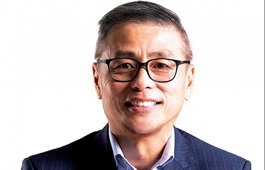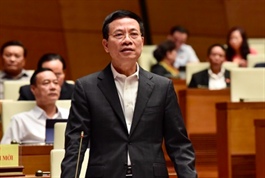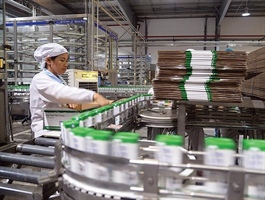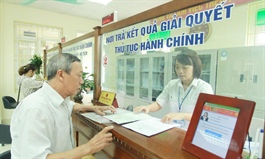Positive changes prevailing in South Korean investments
Positive changes prevailing in South Korean investments
The lingering pandemic has already reshaped the global financial market, but foreign funds have still made their own ways into Vietnam. Kim Tae Hee, head of Capital Markets and Trading at Shinhan Bank, dives into how South Korean financiers are beefing up their presence in this landscape.

Kim Tae Hee, head of Capital Markets and Trading at Shinhan Bank
|
With successful preventive measures against COVID-19, Vietnam is still the brightest economic spot thanks to its two engines of growth – export demand and domestic consumption – with recorded 2.12 per cent GDP growth during the first nine months of 2020 despite negative growth in most parts of the world.
In the months ahead, the World Bank and some foreign financial institutions forecast an annual growth rate of 2.8-3 per cent for Vietnam in 2020, and a return to pre-crisis growth of 6.8-7.8 per cent in 2021.
And Vietnam’s exports shall continue to outperform and attract foreign direct investment (FDI) inflows from many countries including South Korea and Japan thanks largely to several reasons.
First of all are agreements with its major trade partners, especially the EU-Vietnam Free Trade Agreement, which has resulted in $700 million of goods going to the EU after two months of implementation.
Secondly, many multinational companies have relocated to Vietnam or still consider it.
Thirdly, a stable and sound financial market of Vietnam will support its high economic growth. The State Bank of Vietnam has also managed to stabilise the financial market and carry out monetary easing including reducing interest rate by keeping abreast of government fiscal policy.
More thrust will be enforced to propel FDI inflow to Vietnam, especially from South Korea – the leading overseas investor here. South Korean capital inflows into Vietnam will keep increasing after the pandemic for several reasons.
First of all, Vietnam created successful measures against COVID-19 and it will make Vietnam’s economy grow faster than other countries. Secondly are the aforementioned strong trade agreements with other countries. Thirdly, Vietnam boasts an attractive investment environment which includes excellent labour power and strong domestic demand. At the same time, the middle class and young population in Vietnam are gradually increasing, as well as the economic growth in general.
Fourthly, thanks to the positive open-door policies of the Vietnamese government and many reforms in administrative procedures and tariff incentives, the capital injection of South Korean companies into Vietnam is sharply increasing, and I have noticed that the fund seems to be more impressive year by year.
Last but not least, Vietnam has great geographic advantages, supporting South Korean firms to approach the surrounding markets more easily than any other country in Southeast Asia.
The Bank of Korea recently revealed that the domestic economy this year is likely to decline more strongly than previously expected. Along with this, FDI inflows into Vietnam will increase following the trend of shifting from China.
Due to some domestic factors, some South Korean companies are seeking new markets with high potential growth, and Vietnam emerges as one of the brightest nations. However, until now there is no crystal evidence of the number of enterprises in China actually moving to Vietnam – we need time to see the trends because COVID-19 is still very complicated, and many companies may wait for some sort of closure of the situation.
Notwithstanding, Vietnam is a potential destination for business development and investment expansion for South Korean enterprises, especially small- and medium-sized ones. Therefore, in the future, we can see positive changes in South Korean investment capital into Vietnam.
The entire global economy is still negatively impeded by the lingering health crisis, and of course the South Korean economy is not out of it. We can see that South Korean FDI inflows in Vietnam fell 47 per cent in the first half of 2020 just like with other countries.
Through the wave of South Korean investment into Vietnam has focused on textiles, retail, and electronics, capital inflows into the financial sector still surged in the first half of this year.
Considering that South Korean banking sectors are meeting some difficulties with an ageing population, low interest rates, and many corporations moving overseas, money inflows to the financial sector in Vietnam will be maintained in the time to come. With the pandemic situation and the current China-US trade war, South Korean investment flows are trying to change direction to new destinations, in which Vietnam still remains as an attractive one alongside Southeast Asian countries such as Indonesia, Myanmar, and Cambodia.
On the flip side, each situation has its own merits and disadvantages. There will be some hindrances – for instance, different accounting standards with the global market are a negative factor for investing in finance sectors in Vietnam.
Currently, the International Financial Reporting Standards are viewed as the global language which could enable cross-border financial transactions at lower costs and greater transparency, but not so many Vietnamese entities can successfully adopt this international standard to best suit their business situation.
The maximum rate of foreign ownership in commercial banks is capped at 30 per cent in Vietnam. Undoubtedly, the ratio is one of the biggest factors impacting all international investors who are keen on jumping onto the banking bandwagon. Some South Korean investors would like to get clear management rights. However, this 30 per cent cap, from my perspective, cannot remain an obstacle in the future. I believe that South Korean investors will change their investment appetite in the future.
To seize the opportunity after the pandemic, the Vietnamese government needs to operate flexibly and open up the capital market to attract more FDI, as well as overseas institutional investment.



























